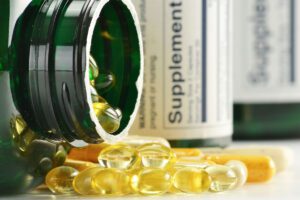Navigating an ovarian cancer diagnosis involves embracing a holistic approach to care, and one crucial aspect is a well-balanced diet. However, there’s no one-size-fits-all answer to the question, “What’s the best diet for an ovarian cancer patient?”
An optimal ovarian cancer diet varies from person to person, depending on treatment plans and goals. Frequently, poor nutrition combined with treatment side effects such as nausea, diarrhea, and loss of appetite can lead to loss of muscle or lean body mass. Unaddressed muscle loss is associated with greater chemotherapy toxicity and overall poorer outcome and survival in cancer patients. Let’s explore the importance of tailoring your diet to meet your unique nutritional needs and address common concerns faced during and after treatment.
Dispelling Myths
While many wish for magic food to prevent or fight ovarian cancer, research hasn’t identified a singular dietary hero. Instead, it’s the overall dietary pattern that plays a key role. Rather than fixating on specific foods, it’s about creating an individualized diet that manages treatment side effects and promotes progression-free survival. Remember, there are no foods known to cause ovarian cancer, offering reassurance as you make mindful dietary choices.
Boosting Immune Health
Supporting your immune system is essential during chemotherapy or other treatments. A balanced diet rich in plant-based foods and proteins forms the foundation. Incorporate citrus fruits, garlic, nuts, seeds, spinach, and berries to optimize immune function. Adequate sleep and moderate exercise contribute significantly to ensuring your immune system operates at its best. Focus on maintaining a healthy lifestyle to bolster your body’s defenses.
Food Safety Matters
During cancer treatment, a weakened immune system requires extra attention to food safety. Simple habits like washing your hands before meals and thoroughly rinsing fresh produce become crucial. Considering how vulnerable your immune system becomes during treatment, avoiding raw, undercooked, or unpasteurized foods may be best.
Navigating Supplements
While the market is flooded with immune-boosting supplements, exercise caution. Some are more marketing hype than scientifically proven aids. The American Institute for Cancer Research recommends getting your nutrients primarily from your diet, as certain supplements may interfere with treatments. Speak with your doctor to learn if you should avoid them or if certain supplements are allowed.
Foods You Shouldn’t Eat
Balance is key. As they say, too much of anything isn’t a good thing, including the limits you put on what you eat. An overly restrictive diet may not benefit you in the long run. Instead, consider a protein rich diet while minimizing red meats, processed foods, added sugars, and alcohol.
Optimizing Your Diet
Crafting an optimal diet involves being plant-forward. Don’t feel like you have to go vegan or vegetarian, but you may try to center your meals around plant-based foods. Emphasize hydration, aiming for at least two liters of water daily. Organic produce is beneficial, but the focus should be on incorporating fresh, plant-based options into your diet however you can.
Nutrition Tips for Ovarian Cancer Treatment
Ovarian cancer treatment is a challenge that demands strength, resilience, and focus–and nutritious just so happens to power all three.
The role of balanced and healthy nutrition cannot be overstated during this crucial time. Here are essential nutrition tips to support your well-being, helping you heal, stay healthy, and feel better throughout your ovarian cancer treatment.
Get Enough Fuel for Healing
Ensuring you take in enough calories every day is crucial. Your body requires energy to heal, and a sufficient caloric intake supports this vital process.
Build a Balanced Diet
Embrace a balanced diet incorporating a healthy variety of protein, carbohydrates, and fats. Keeping nutritious foods on hand ensures you have the nourishment you need when you need it.
Aim for Weight Maintenance
Maintaining a healthy weight is an integral part of your overall well-being. It provides a sturdy foundation for your body to cope with the demands of cancer treatment.
Stay Active
Keep your body moving to work your muscles. Consult your doctor about suitable exercises tailored to your condition. Physical activity contributes not only to your physical strength but also to your overall well-being.
Sip Your Way to Wellness
Staying hydrated is vital. Hydration supports healing and helps your body navigate the challenges of treatment. Ensure you drink enough fluids to maintain your body’s equilibrium.
How Nutrients Support Healing
Your body requires specific nutrients for the healing process. Sufficient calories and protein aid in tissue recovery post-surgery, preventing muscle mass loss.
Immune system boost: A robust immune system is your ally. Healthy nutrition helps maintain cell counts, reducing the risk of infections common during chemotherapy.
Cell count maintenance: Chemotherapy may impact cell counts. A balanced diet aids in sustaining cell counts, ensuring you stay on course with your treatments.
Balancing Nutrition and Treatment Side Effects
Managing treatment-related side effects through diet is a proactive approach to maintaining or improving your quality of life. Tailoring your diet can help alleviate constipation, diarrhea, nausea, changes in taste, mouth sores, loss of appetite, and fatigue. Small, frequent meals, hydration, and experimenting with flavors and textures can help stimulate your appetite–and it’s tasty!
For nausea and vomiting:
- Opt for small meals and snacks throughout the day.
- If smells bother you, delegate cooking duties and steer clear of the kitchen.
- Take prescribed nausea medications and eat when they are most effective.
Loss of appetite:
- Start small. Opt for small, high-calorie meals and snacks.
- Make it count. Include high-protein foods like peanut butter, avocado, smoothies, and nuts.
- Make eating convenient. Keep food prepared and ready.
- Stay active to stimulate your appetite.
Constipation:
- Stay hydrated with water, electrolyte-infused water, milk, fruit juice, decaffeinated tea, or sports drinks (avoid caffeine).
- Integrate high-fiber foods like fruits, vegetables, whole grains, nuts, and seeds.
Feeling bloated
- Drink liquids without a straw.
- Avoid carbonated beverages.
- Steer clear of greasy or gassy foods.
Fever
- Boost your calorie intake, as fever tends to increase the rate you burn calories.
- Stay hydrated, preferably with calories-rich fluids, like chicken soup or protein smoothies.
Contact your doctor if your fever reaches 100.4°F or higher.
Your journey with ovarian cancer is unique, and so should your approach to nutrition. Embrace a diet that aligns with your needs, focusing on a balanced and plant-forward approach.
Work closely with your doctor or dietitian to plan your meals and grocery shopping effectively. Their guidance ensures you maximize the benefits of your diet, supporting your journey towards healing and well-being. You’re not alone on this path; your nutrition is a crucial companion in the fight against ovarian cancer.





